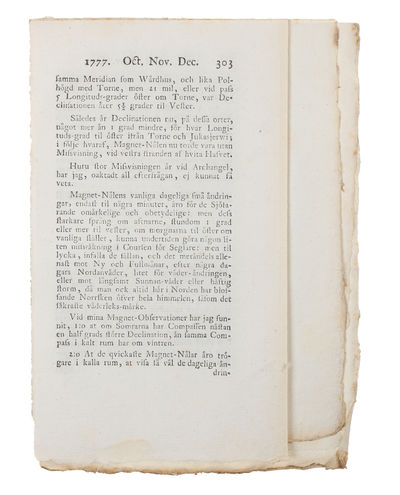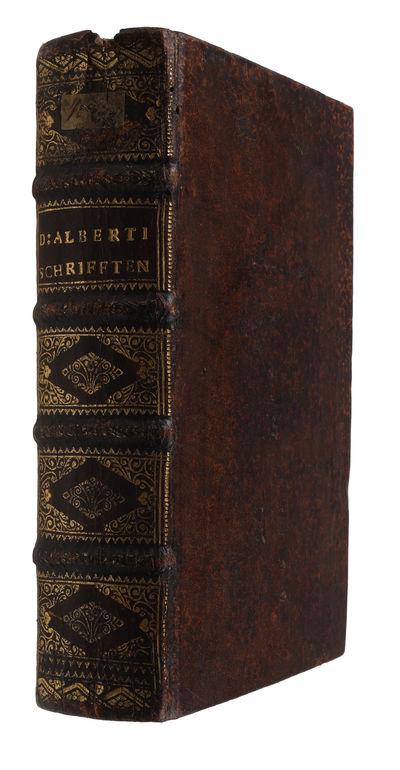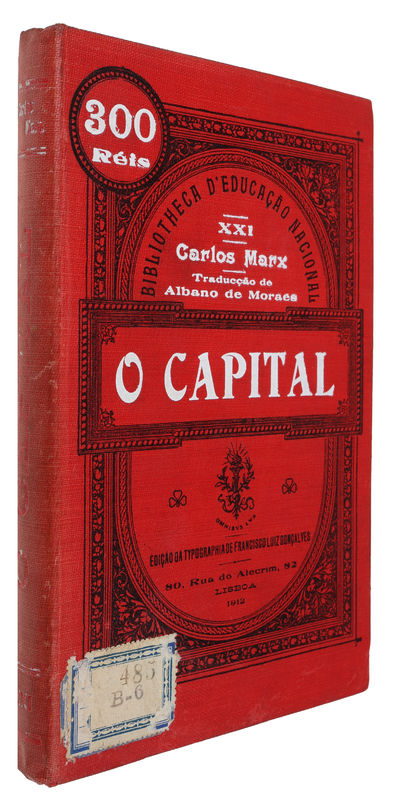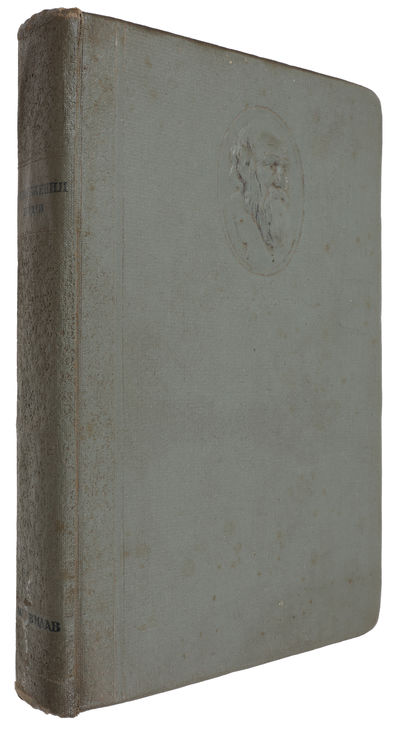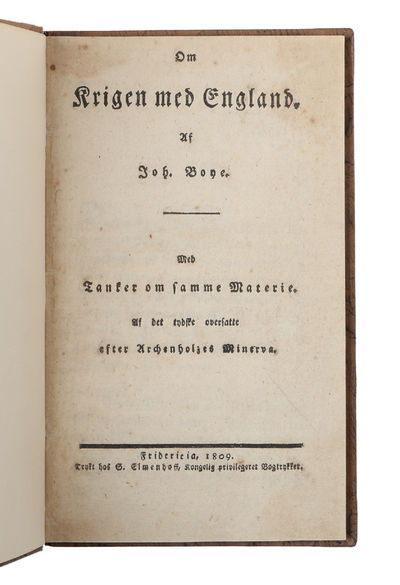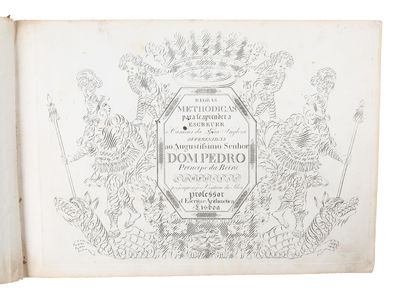CAREY, H.C.
Principles of Political Economy. 4 Parts in 3 vols. Part the First: Of the Laws of the Production and Distribution of Wealth. Part the Second: Of the Causes which Retard Increase in the Population of Wealth, and Improvement in the Physical and Moral C... - [THE MOST IMPORTANT 19TH CENTURY ECONOMIC WORK PUBLISHED IN THE USA]
Herman H. J. Lynge & Søn A/S
lyn48130
Philadelphia & London, 1837-1840. 3 volumes lex 8vo. Bound in three absolutely lovely, contemporary, uniform moiré-impressed dark brown full cloth bindings. The impressed pattern of the cloth varies on the three bindings, contributing to the charm of the set. Gilt lettering to spines. Very neatly and gently re-backed, barely noteceable, laying down the original cloth spines. Some brownspotting, mostly to end-papers and first and last leaves in each volume. (2), XVI, 342; VI, pp. (9) - 466; (6), 270 pp. - Fully complete, collation in accordance with Einaudi.
The rare first edition of Carey's extremely influential main work, which was to become the standard representation of the American School of Economic Thought and the dominant theoretical work within political economy - it fact, it dominated the US economic system from the time of its appearance up until 1973. It "made the fundamental departure [from the British economic theorists] of declaring that land derives its value from the capital expended on it," (Dictionary of American Biography) and that the wages of the workers increase faster than the returns of capital, thereby lending towards "a progressive diffusion of wealth among the poorest classes of society." (Dictionary of American Biography). Today Carey is considered the most internationally influential political economist and social scientist produced in nineteenth-century America.In the present work Carey essentially advocates the laissez-faire economic theory which has become a fundamental system of the North American political economy. He controverts the views of Malthus, Ricardo, McCulloch, and Torrens. He rejects Ricardo's rent theory, while he sets forth his own redistribution theory, "which called for progressive dispersal of wealth among the poorest families in society" (Brennan, The Politics of National Capitalism, p. 136)."The scope of Carey's optimistic belief in a harmonious order gradually widened. In his Principles of Political Economy the landowner becomes part of the harmonious order, with his earnings depicted as a return on his capital rather than a gift of nature. Population growth does not disturb the harmony as it is restrained by social conditioning." (The New Palgrave,p. 370). Ironically, Carey later changed his view on political economy, leaning towards a more protectionist stand point, a viewpoint which greatly influenced President Abraham Lincoln.Carey's influence upon the US-economy and the entire North American political establishment cannot be overestimated. Henry Carey emerged as the senior, global strategist among American military and intelligence leaders and - more importantly - he served as chief economic advisor to Abraham Lincoln during his presidency. Carey advocated the continuance of Abraham Lincoln's Greenbacks policy of debt-free, government-issued money as a way of freeing America's economy from British capitalists, who sought to control America's wealth. Lincoln furthermore sought to thoroughly modernize the American economy, including banking and the railroads, by creating cooperation - not conflict as, seen with the socialists in Europe - between labour and capital and Carey became the economic theoretician to support these views. Carey's enormous influence extended across the Atlantic Ocean to several European countries, especially Germany, who rapidly changed into an industrial giant in the 1870'ies and benefitted from Carey's policies. "This German revolution was affected largely through the personal efforts of American economist Henry C. Carey, as Bismarck welcomed Carey's intervention to educate and help shape a German policymaking elite. Carey was world renowned as intellectual leader of the forces backing Abraham Lincoln's agenda: government Library of Congress credit and high tariffs to build railroads, mills, and mines. With the political power and prestige of the Union's Civil War victory behind them, and the amazing success of U.S. industrialization under protectionism, Carey and his allies were taking this nationalist program out to German, Russia, Japan and the rest of the world." (Chaitkin, How Carey and Bismarck Transformed Germany, p. 66)Schumpeter too was sympathetic toward Carey's thinking: "We may feel that the United States would be a happier place and would have attained a higher cultural level by now if a larger part of the country's energies had gone into other than business pursuits and if, in consequence, her industrial development had been slower. This, however, is a matter of personal evaluation and does not excuse us from recognizing that Carey's was a great vision and that, in most respects, this vision expressed adequately both the situation and spirit of the country. Moreover, we cannot excuse ourselves from recognizing that this vision was independent of its deplorable analytic implementation and capable of being implemented more satisfactorily." (Schumpeter, History of Economic Analysis, pp. 516-7.). "Especially popular in Europe, Principles was translated into Swedish and Italian as well as German, Japanese, Portuguese, and Russian and was reprinted numerous times throughout the nineteenth century" (Brennan, The Politics of National Capitalism, p. 136).Einaudi 888Goldsmith 29768Sabin 10836
The rare first edition of Carey's extremely influential main work, which was to become the standard representation of the American School of Economic Thought and the dominant theoretical work within political economy - it fact, it dominated the US economic system from the time of its appearance up until 1973. It "made the fundamental departure [from the British economic theorists] of declaring that land derives its value from the capital expended on it," (Dictionary of American Biography) and that the wages of the workers increase faster than the returns of capital, thereby lending towards "a progressive diffusion of wealth among the poorest classes of society." (Dictionary of American Biography). Today Carey is considered the most internationally influential political economist and social scientist produced in nineteenth-century America.In the present work Carey essentially advocates the laissez-faire economic theory which has become a fundamental system of the North American political economy. He controverts the views of Malthus, Ricardo, McCulloch, and Torrens. He rejects Ricardo's rent theory, while he sets forth his own redistribution theory, "which called for progressive dispersal of wealth among the poorest families in society" (Brennan, The Politics of National Capitalism, p. 136)."The scope of Carey's optimistic belief in a harmonious order gradually widened. In his Principles of Political Economy the landowner becomes part of the harmonious order, with his earnings depicted as a return on his capital rather than a gift of nature. Population growth does not disturb the harmony as it is restrained by social conditioning." (The New Palgrave,p. 370). Ironically, Carey later changed his view on political economy, leaning towards a more protectionist stand point, a viewpoint which greatly influenced President Abraham Lincoln.Carey's influence upon the US-economy and the entire North American political establishment cannot be overestimated. Henry Carey emerged as the senior, global strategist among American military and intelligence leaders and - more importantly - he served as chief economic advisor to Abraham Lincoln during his presidency. Carey advocated the continuance of Abraham Lincoln's Greenbacks policy of debt-free, government-issued money as a way of freeing America's economy from British capitalists, who sought to control America's wealth. Lincoln furthermore sought to thoroughly modernize the American economy, including banking and the railroads, by creating cooperation - not conflict as, seen with the socialists in Europe - between labour and capital and Carey became the economic theoretician to support these views. Carey's enormous influence extended across the Atlantic Ocean to several European countries, especially Germany, who rapidly changed into an industrial giant in the 1870'ies and benefitted from Carey's policies. "This German revolution was affected largely through the personal efforts of American economist Henry C. Carey, as Bismarck welcomed Carey's intervention to educate and help shape a German policymaking elite. Carey was world renowned as intellectual leader of the forces backing Abraham Lincoln's agenda: government Library of Congress credit and high tariffs to build railroads, mills, and mines. With the political power and prestige of the Union's Civil War victory behind them, and the amazing success of U.S. industrialization under protectionism, Carey and his allies were taking this nationalist program out to German, Russia, Japan and the rest of the world." (Chaitkin, How Carey and Bismarck Transformed Germany, p. 66)Schumpeter too was sympathetic toward Carey's thinking: "We may feel that the United States would be a happier place and would have attained a higher cultural level by now if a larger part of the country's energies had gone into other than business pursuits and if, in consequence, her industrial development had been slower. This, however, is a matter of personal evaluation and does not excuse us from recognizing that Carey's was a great vision and that, in most respects, this vision expressed adequately both the situation and spirit of the country. Moreover, we cannot excuse ourselves from recognizing that this vision was independent of its deplorable analytic implementation and capable of being implemented more satisfactorily." (Schumpeter, History of Economic Analysis, pp. 516-7.). "Especially popular in Europe, Principles was translated into Swedish and Italian as well as German, Japanese, Portuguese, and Russian and was reprinted numerous times throughout the nineteenth century" (Brennan, The Politics of National Capitalism, p. 136).Einaudi 888Goldsmith 29768Sabin 10836
Adress:
Silkegade 11
DK-1113 Copenhagen Denmark
Telefon:
CVR/VAT:
DK 16 89 50 16
E-post:
Webb:
![Principles of Political Economy. 4 Parts in 3 vols. Part the First: Of the Laws of the Production and Distribution of Wealth. Part the Second: Of the Causes which Retard Increase in the Population of Wealth, and Improvement in the Physical and Moral C... - [THE MOST IMPORTANT 19TH CENTURY ECONOMIC WORK PUBLISHED IN THE USA] (photo 1)](https://d3525k1ryd2155.cloudfront.net/h/862/979/1035979862.0.l.jpg)
![Principles of Political Economy. 4 Parts in 3 vols. Part the First: Of the Laws of the Production and Distribution of Wealth. Part the Second: Of the Causes which Retard Increase in the Population of Wealth, and Improvement in the Physical and Moral C... - [THE MOST IMPORTANT 19TH CENTURY ECONOMIC WORK PUBLISHED IN THE USA] (photo 2)](https://d3525k1ryd2155.cloudfront.net/h/862/979/1035979862.1.l.0.jpg)
![Principles of Political Economy. 4 Parts in 3 vols. Part the First: Of the Laws of the Production and Distribution of Wealth. Part the Second: Of the Causes which Retard Increase in the Population of Wealth, and Improvement in the Physical and Moral C... - [THE MOST IMPORTANT 19TH CENTURY ECONOMIC WORK PUBLISHED IN THE USA] (photo 3)](https://d3525k1ryd2155.cloudfront.net/h/862/979/1035979862.2.l.0.jpg)
![Principles of Political Economy. 4 Parts in 3 vols. Part the First: Of the Laws of the Production and Distribution of Wealth. Part the Second: Of the Causes which Retard Increase in the Population of Wealth, and Improvement in the Physical and Moral C... - [THE MOST IMPORTANT 19TH CENTURY ECONOMIC WORK PUBLISHED IN THE USA] (photo 4)](https://d3525k1ryd2155.cloudfront.net/h/862/979/1035979862.3.l.0.jpg)
